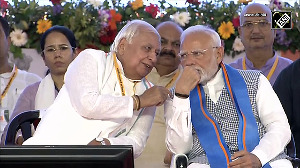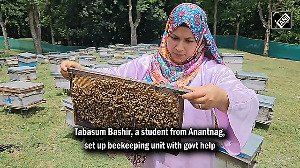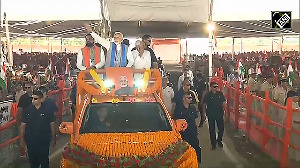Abduction for the release of jailed Maoists is becoming a trend in Odisha.
Considering the almost habitual surrender of various state governments to their demands, the extremists will use this tactic regularly, argues Bibhu Prasad Routray.
It took precisely 20 days for Sabyasachi Panda, secretary of the Odisha state organising committee of the Communist Party of India-Maoist and 12 days for another set of CPI-Maoist abductors belonging to the Srikakulam-Koraput divisional committee of the Andhra-Odisha border special zonal committee to bring the Odisha government to its knees.
On April 4, Chief Minister Naveen Patnaik announced his decision to 'facilitate the release of 27 persons' in the state assembly.
The 27 persons included 15 members of the Chasi Mulia Adivasi Sangha, a front organisation of the CPI-Maoist, and eight CPI-Maoist cadres in exchange for the release of Biju Janata Dal MLA Jhina Hikaka.
Four more persons -- whose names will be announced today -- would be freed in return for the release of the abducted Italian national, Paolo Bosusco.
It remains to be seen whether the decision would derive the intended result, for the number of persons the government plans to release is far less than what the Maoists had initially demanded.
There is every reason for commentators to come down heavily on the Naveen Patnaik government's capitulation to the Maoist demands.
Despite restless attempts at rationalising the decision, it is undeniable that abduction for the release of jailed Maoist cadres/sympathisers is becoming a trend in India's Maoist theatre.
More importantly, fuelled by the almost habitual surrender of various state governments to their demands, extremists will use this tactic regularly, if not increasingly.
The following are few of the recent cases underlying the trend.
In October 2009, Maoists released Atindranath Dutta, the officer-in-charge of the Sankrail police station in West Midnapore district in West Bengal, in exchange for the freedom of 24 tribal women arrested for aiding extremists.
In February 2010, Maoists released abducted Jharkhand block development officer Prashant Kumar Layak after keeping him hostage for six days. In order for this to happen, then chief minister Shibu Soren agreed to free 14 arrested cadres.
In September 2010, Maoists released three policemen in Bihar, eight days after they were abducted from Lakhisarai district, after an unknown number of Maoists were released. Director General of Police Neelmani, however, claimed that the release was forced on the Maoists 'after the police sealed the escape routes of the ultras in the forests and hills.'
In February 2011, Odisha released Maoist ideologue Ganti Prasadam to secure the release of Malkangiri district collector Vineel Krishna and a junior engineer.
It is understandably difficult for the government to maintain a 'no negotiation and no release' stand, when civilians are in the custody of extremists and face a real danger of being harmed.
This time around, the government appears to have acted under tremendous pressure from New Delhi, the Italian government, the abducted MLA's family members and the Opposition parties, who missed no opportunity to run down the government.
However, though pressure is almost a natural accompanying factor in such episodes, there are a few important questions that remain unanswered.
Were all other options were exhausted before the decision to release the Maoists and their sympathisers were made?
Were the abducted persons in real danger when the government decided to capitulate?
Could the state government not have procrastinated its decision, thereby driving the extremists to some sort of desperate need to climb down from their demands?
Could not strategies of other kinds, such as encirclement of the area, been carried out, to increase pressure on the Maoists who were almost on the run?
While the above decisions pertain to the operational spectrum, and are best decided by the security force establishment, the state government's strategy appeared to have gone astray in its initial assessment of Sabyasachi Panda's strength and his relationship with the CPI-Maoist top brass.
In its wisdom, the Odisha home department decided that a 'difference' exists between the 'rouge' Panda and the 'rational' CPI-Maoist leadership. They believed the latter would invariably force the former to release the abducted persons sooner than later, since the CPI-Maoist would not sanction the abduction of foreign nationals.
While Panda did release of one the abducted Italians after 10 days, he could hold on to the other one for the rest of the duration, thereby vastly increasing pressure on the state government. The CPI-Maoist did not issue a single press release on the Italian's abduction.
This meant that the so-called schism between Panda and the CPI-Maoist senior leadership did not exist or belonged to a category that could be overlooked for operational gains. The CPI-Maoist also appeared comfortable with the idea of using foreign nationals as trophies to achieve their objectives.
The March 23 abduction of BJD MLA Hikaka, this time by the 'real Maoists' belonging to the ADBSZC, appeared to have tilted the balance decisively in favour of the abductors.
The stand of the second group -- of not negotiating with the government -- left Naveen Patnaik with little option but to succumb.
The option of acceding to one group while not doing so for the other was an option to test the camaraderie between the two groups. But it was not tried out for unexplained reasons.
It is expected that the Odisha government will try to ride the moral high horse by justifying a decision that saved the lives of two innocent civilians.
But it cannot deny the fact that, by doing this so spinelessly, it has conceded a morale-boosting victory to the Maoists. And, in the stalemated fight between the state and the extremist outfit, each victory counts.
Bibhu Prasad Routray served as deputy director in the National Security Council Secretariat, Government of India, New Delhi.







